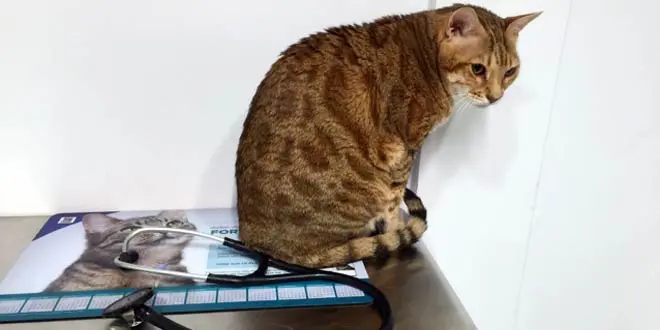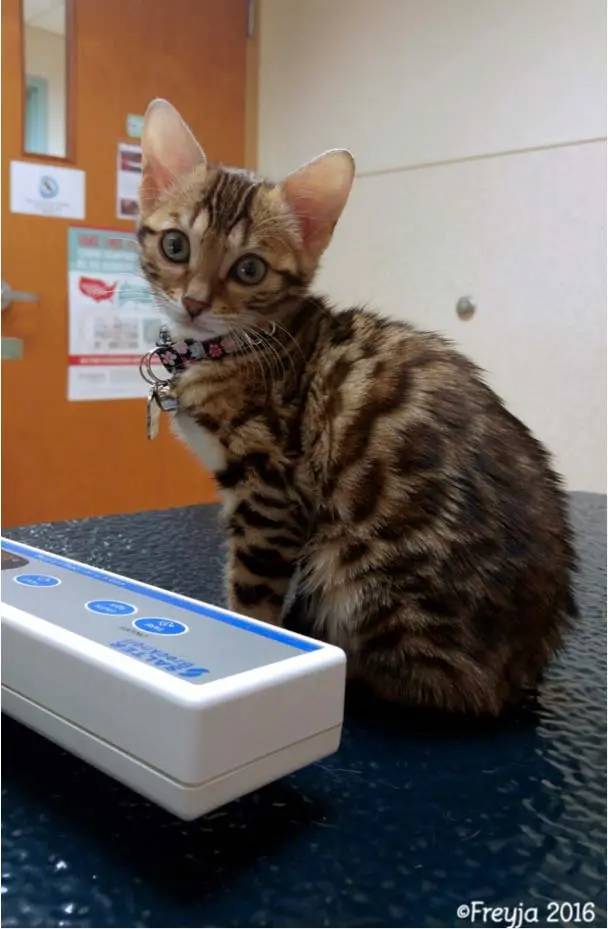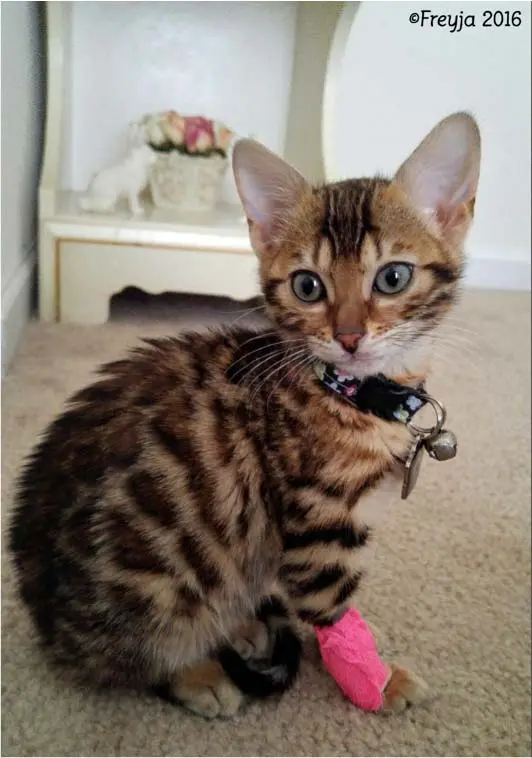[ads1] [dropcap]W[/dropcap]hen Your Cat Suddenly Becomes Ill…
As pet parents, one of our greatest fears is having one of our purr babies suddenly become sick. When illness does strike, often times we may wonder just how urgent the situation is and who is best equipped to properly care for your cat. I faced an emergency vet situation very recently. My 11 week old bengal kitten, Freyja, was the absolute picture of health when she came home from her breeder. She saw a vet the next day and passed her wellness check with flying colors. Not even two weeks later…she suddenly became very, very sick.
She stopped eating on a Tuesday. She had horrible diarrhea, was unable to stop vomiting (more like dry heaving with some bile coming up), was incredibly lethargic, and was running a low-grade temp. She had lost 10% of her body weight literally over night.She was taken to her regular vet for an exam, a diagnosis and a treatment plan. The vet set an IV for her and administered anti-nausea meds. A complete blood panel was done on her. The vet advised that the results of the blood panel looked normal. Stool samples presented negative for any parasites (including coccidia and giardia). She was given some oral antibiotics and sent home. The vet had no answers as to why she was sick…and all I could do was keep pushing fluids and try to get her to eat. I was giving her fluids via syringe, and was feeding tiny amounts of wet kitten food and bits of cooked chicken off my finger.

Freyja continued to deteriorate rapidly. She still refused to eat or drink. The oral medications were not helping her at all. The vomiting and diarrhea were getting worse. Her regular vet advised that there really was not much left that could be done for her through their office, and it was now “wait and see”. At this point, I decided to take her to an emergency vet center. Freyja was officially admitted into the ICU. Every possible test available was done on her. X-rays were clear. Bloodwork was 100% normal. Distemper (parvovirus) test was negative. FeLV (leukemia) test was negative. FIV (feline HIV) tests were negative. All parasite tests in fecal samples were negative. FCoV and FIP tests were negative. The vet was clueless as to why she was so sick. Freyja was sedated, and was hooked up to an IV for fluids and antibiotics. I was advised that Freyja was clearly very sick, and the vet was not sure what her prognosis would be. She had to stay hospitalized overnight. I received a call from the vet late that evening advising Freyja had started to eat! The IV fluids had her feeling a bit better as well, and she was crying very loudly from her cage.
The next morning, I was told Freyja could come home! She had shown great improvement overnight. Her appetite was back, and she started showing her firey little personality again. Once home, I quarantined her in a bedroom to keep her separated from my other bengal. Every day she showed more signs of improvement. 6 days since the mystery illness struck, she is back to 100%.

Talk about a very scary experience. I have learned quite a bit from this whole incident though. There IS definitely a difference between a regular veterinarian office and an emergency veterinarian office. A regular vet is great for annual check ups, vaccinations, spay or neutering your pet, and other non serious, non emergent needs. An emergency vet is who you need to seek out for any serious, life threatening emergency. If you suspect your cat has say, a URI, your regular vet is who to see. If your cat suddenly shows violent, long-term gastrointestinal upset, you should rush your cat to an emergency center. I am extremely grateful for the in-depth care provided by the emergency vet center. Their care saved this tiny little life.
Related: Man Creates the First AI Veterinarian

If you’re concerned about your pet, you should never feel embarrassed about calling a veterinarian. Veterinarians are used to emergencies and they prepare for them. While your regular veterinarian office may be closed after a certain time, 24 hour emergency vet centers are always open and ready to help. If you notice your pet behaving in a way that’s unusual for her, or if something just doesn’t seem right, you may have picked up on a subtle sign of a real problem. To find out, you can call your veterinary hospital, or an emergency animal hospital near you. By asking a few questions over the phone, an emergency veterinarian should be able to tell you whether you should bring your cat in right away, or whether she can wait for an examination during your veterinarian’s normal office hours. There are some times, however, when you won’t need to call first. If you notice any of the following problems, bring your cat in immediately for emergency care.
[tie_list type=”checklist”]
- Your cat has experienced some kind of trauma, such as being hit by a car or a blunt object or falling more than a few feet.
- Your cat isn’t breathing or you can’t feel a heartbeat.
- Your cat is unconscious and won’t wake up.
- Your cat has been vomiting or has had diarrhea for more than 24 hours, or she is vomiting blood.
- You suspect any broken bones.
- Your cat is having trouble breathing or has something stuck in her throat.
- Your cat has had or is having a seizure.
- Your cat is bleeding from the eyes, nose, or mouth, or there is blood in her urine or feces.
- You think your cat might have ingested something toxic, such as antifreeze, rat poison, any kind of medication that wasn’t prescribed to her, or household cleansers.
- Your cat, particularly your male cat, is straining to urinate, or is unable to.
- Your cat shows signs of extreme pain, such as crying out, shaking, and refusing to socialize.
- Your cat collapses or suddenly can’t stand up.
- Your cat begins bumping into things or suddenly becomes disoriented.
- You can see irritation or injury to your cat’s eyes, or she suddenly seems to become blind.
- Your cat’s abdomen is swollen and hard to the touch, and/or she’s gagging and trying to vomit.
- You see symptoms of heat stroke.
- Your pregnant cat has gone more than three to four hours between delivering kittens.
[/tie_list]
If you notice any of the symptoms above or you suspect a serious problem, try to get directly in touch with a veterinary professional.
The best way to deal with pet emergencies is to prepare for them, just in case. The next time you take your cat in for a checkup, ask your veterinarian what you should do in case of emergency. Find out whether your animal hospital is open 24 hours, or whether they refer emergency cases on evenings and weekends. If they refer, get the name, address, and phone number of the emergency facility they refer to.
Keep your veterinarian’s name and number in your cell phone contacts. If your veterinarian refers evening and weekend emergencies to another hospital, save that hospital’s name and number as well. This way, if an emergency catch you off guard, you won’t have to worry about finding contact information. You may also want to have a list of pet first aid tips accessible, along with guidelines for human first aid.
To learn more about what may constitute a true vet emergency, here is an external link to a helpful list of pet concerns: http://www.peteducation.com/article.cfm?c=1+2144&aid=2896







